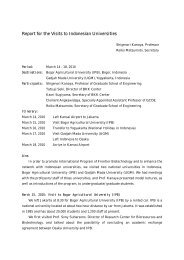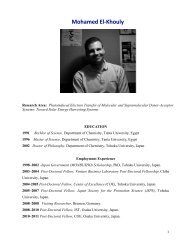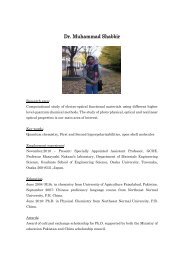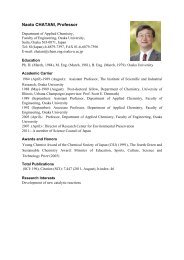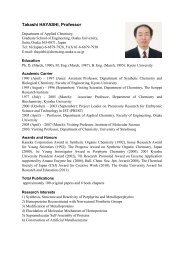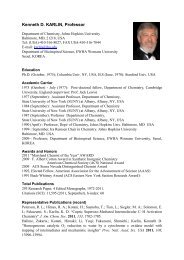Prof. Fukui - Osaka University
Prof. Fukui - Osaka University
Prof. Fukui - Osaka University
Create successful ePaper yourself
Turn your PDF publications into a flip-book with our unique Google optimized e-Paper software.
Kiichi FUKUI, <strong>Prof</strong>essor<br />
Department of Biotechnology,<br />
Graduate School of Engineering, <strong>Osaka</strong> <strong>University</strong>,<br />
Suita, <strong>Osaka</strong> 565-0871, Japan<br />
Tel: 81(Japan)-6-6879-7440, FAX 81-6-6879-7441<br />
E-mail: kfukui@bio.eng.osaka-u.ac.jp<br />
Education<br />
Ph. D. (March, 1978), M. Agr. (March, 1975), B. Agr. (March, 1973): Kyoto <strong>University</strong><br />
Academic Carrier<br />
1978 (April): Researcher, Division of Genetics, National Institute of Agricultural Sciences,<br />
MAF.<br />
1983 (March)-1984 (March): Visiting scholar, Plant Breeding Institute, Cambiridge.<br />
1985 (April): Senior Researcher, Depatment of Molecular Breeding, National Institute of<br />
Agrobiological Resources, MAFF.<br />
1990 (April): Head of Laboratory, Laboratory of Breeding Engineering, Department of Crop<br />
Development, Hokuriku National Agricultural Station, MAFF.<br />
1998 (October): <strong>Prof</strong>essor (Head of Laboratory of Dynamic Cell Biology), Department of<br />
Biotechnology, Faculty of Engineering, <strong>Osaka</strong> <strong>University</strong><br />
2002 (April)-2005 (March) : Visiting <strong>Prof</strong>essor, Department of Mechanical and Mashinery<br />
Science, Graduate School of Engineering, <strong>University</strong> of Tokyo<br />
2010-2013: Director of Modern GP program<br />
2007-: Core member of Global Education and Research Center for Bio-Environmental<br />
Chemistry (Global COE Program) at <strong>Osaka</strong> <strong>University</strong><br />
Awards and Honors<br />
The Japanese Society of Breeding Award (1999), The <strong>Osaka</strong> <strong>University</strong> Award for General<br />
Education (2008), J. Biosci. Bioeng. Award (2003), Award for Biocometition Japan (2003).<br />
Total Publications<br />
Original papers: 150, Review papers: 120, Books and Bookchapters: 70<br />
Research Interests<br />
From the begining of my research career, extensive efforts have been devoted to elucidate<br />
higher-order structure of plant and animal chromosomes, which are the physical carriers of<br />
organized genetic information. Recently, however, we started molecular breeding of bio-diesel<br />
producing plants for these five years because of the increased demands for the low<br />
carbondioxide emission and creation of a low carbon society. We use a tropical shrub,<br />
Jatropha curcas L. as the target plant. First, we introduced some useful genes to produce<br />
higher tolerant Jatropha lines for droughtness by developing an effective transformation<br />
method. Second, all the genome information has been read for the first time. Third, many<br />
molecular markers which are useful for molecular breeding, have been isolated. The similarity<br />
of all Jatropha lines collected from different continents and isles of Africa, Asia, Philippines<br />
is also confirmed, which may be useful for phylogenetic research of Jatorpha.
Global Greening: Toward Low Carbon Society<br />
Kiichi <strong>Fukui</strong>, Suguru Tsuchimoto, Hiroe Sakai<br />
Department of Biotechnology, Graduate School of Engineering, <strong>Osaka</strong> <strong>University</strong>, Suita,<br />
<strong>Osaka</strong> 565-0871, Japan<br />
kfukui@bio.eng.osaka-u.ac.jp<br />
To reconcile increasing energy consumption with worsening global environmental conditions<br />
is a fundamental concern of the contemporary society. Fossil fuel deposits are rapidly<br />
diminishing, and their consumption raises carbon dioxide discharge levels. Alternative fuels,<br />
such as bioethanol and biodiesel, show great promise for alleviating the problems caused by<br />
the consumption of fossil fuel. Jatropha curcas L. is a plant belonging to the family<br />
Euphorbiaceae that is endemic to tropical America. It is now grown commercially in tropical<br />
and subtropical Africa and Asia. Jatropha has considerable potential for various uses<br />
including biofuels. The plant can grow at rainfall levels as low as 200 mm per annum.<br />
Medicinal compounds are found in various parts of the plant, but it is the potentially high<br />
yield of oil per unit land area, which is second only to oil palm, that makes Jatropha an<br />
outstanding biofuel plant. Furthermore, the quality of oil in its seeds is suitable for production<br />
of biodiesel as they contain more than 75% unsaturated fatty acids. Despite its cultivation<br />
throughout the tropical and subtropical world, the positive attributes of this plant are not fully<br />
understood in terms of breeding and utilization. This can be attributed mainly to the lack of<br />
information on its genetics and genomics. The genome size (∼410 Mb) and the base<br />
composition have been estimated by flow cytometry, and karyotypes have been characterized.<br />
Expressed sequence tags (ESTs) from developing and germinating Jatropha seeds have been<br />
reported. Furthermore, the whole genome of Jatropha curcas was sequenced, using a<br />
combination of the conventional Sanger method and new-generation multiplex sequencing<br />
methods. Total length of the non-redundant sequences thus obtained was 285 858 490 bp<br />
consisting of 120 586 contigs and 29 831 singlets. They accounted for ∼95% of the genecontaining<br />
regions with the average G + C content was 34.3%. A total of 40 929 complete and<br />
partial structures of protein encoding genes have been deduced. Comparison with genes of<br />
other plant species indicated that 1529 (4%) of the putative protein-encoding genes are<br />
specific to the Euphorbiaceae family. A high degree of microsynteny was observed with the<br />
genome of castor bean and, to a lesser extent, with those of soybean and Arabidopsis thaliana<br />
and a total of 21 225 unigene data have been generated. Further information on the genomic<br />
sequences and DNA markers is available at http://www.kazusa.or.jp/jatropha/ 1) . In parallel<br />
with genome sequencing, development of an effective transformation method was explored.<br />
Based on the method developed, several new transgenic Jatropha plants were developed and<br />
now are examined under the tropical conditions 2) .<br />
References<br />
(1) Sato, S. et al. DNA Res. 2012, 18, 65-76.<br />
(2) Khemkladngonen, N. et al. Plant Biotech. Rep. 2011, 5, 235-243.



